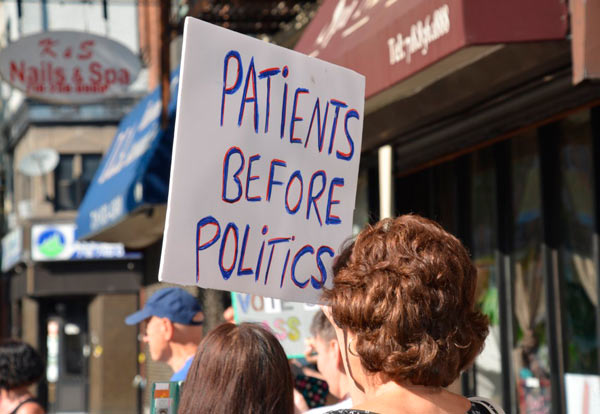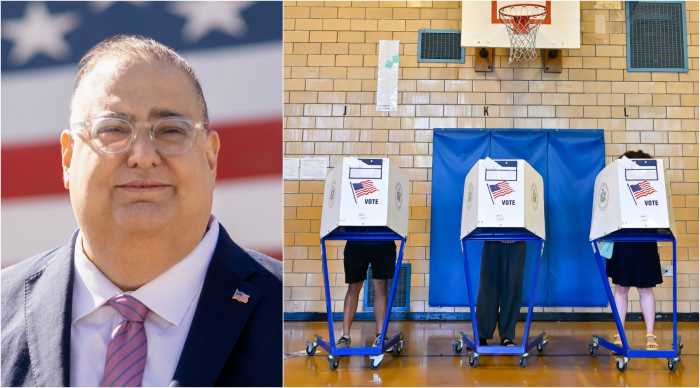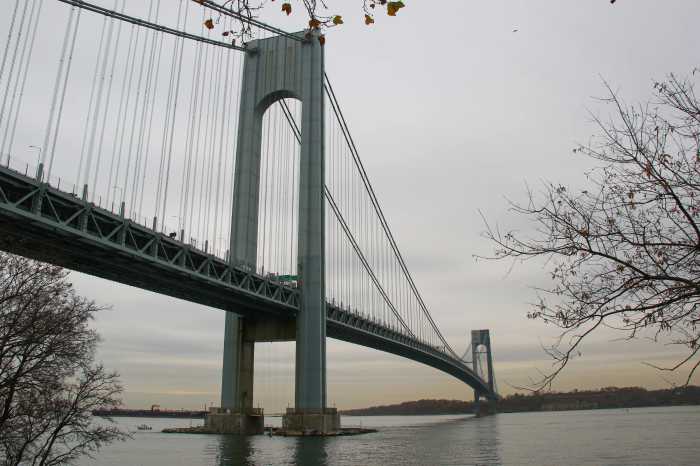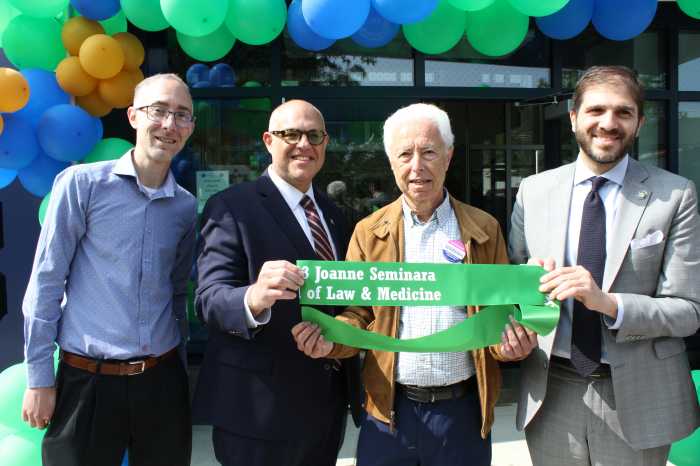Southern Brooklynites rallied in front of state Sen. Martin Golden’s Bay Ridge office on May 31 demanding the legislator support a single-payer, universal health care bill that’s stalled in the state Senate.
The New York Health Act aims to replace New York’s multi-payer system with a program that would universally cover state residents. But the legislation is tied up in the Senate’s health committee, and locals are calling on Golden (R–Bay Ridge) — a committee member — to use his role to bring the act to a vote before the legislative session ends on June 21.
“Golden is on the committee that the bill has historically been stuck in, and we weren’t even calling on him to vote for it, we just want him to get it out of committee,” said Bay Ridgite Mallory McMahon, an organizer with Fight Back Bay Ridge who attended the demonstration. “We just want it to have a chance.”
If passed, the act would replace the state’s current system in which individuals, businesses, and government institutions pay public and private insurers for health care.
A system dubbed the “New York Health Plan” by legislators would foot the bill for medically necessary care, including doctor visits, hospitalization, prescription drugs, and a slew of other treatments. It would be financed by a progressive increase in payroll taxes and new taxes on capital gains and dividends.
The act was originally proposed by Assemblyman Richard Gottfried (D–Manhattan) in 1992 and has passed in the Assembly for the third consecutive year, yet it never manages to make it to a vote in the state Senate. But this year, support for the bill is gaining steam — partly because of the uproar over the house’s passage of the American Health Care Act, which would leave millions uninsured and skyrocket insurance costs for those with pre-existing conditions.
It’s an issue that hits home for many Southern Brooklynites who would lose access to vital care if the Affordable Care Act is dismantled, said the lead organizer behind the rally.
“What we’re facing, and what millions of Americans are facing, is that our whole world is turning upside down,” said Bath Beach resident Sarah Zorn, whose husband has a chronic bowel disease that crippled his life for nearly 13 years until he was able to afford insurance. “I’m almost more afraid than before, because I know what our life could be when he’s healthy and I’m so scared of loosing that.”
Zorn’s husband requires a $58,000 monthly infusion, for which the couple pay a $15 copay through the Affordable Care Act, but if a lapse in coverage caused him to miss a dose, the drug would lose its potency in his system and he would have to go back to the daily struggle of managing his symptoms, according to Zorn.
But the New York Health Act could be a lifeline for the Zorns and other New Yorkers faced with life-altering ultimatums, she said.
“This act would be a tremendous salve from what we’re facing in Washington, and I think if New York State has the chance to take the lead on this it should,” said Zorn. “I’m a food writer, this is all new to me, but I’ve kind of made it my mission to educate people that this bill exists. That was kind of the thrust of the rally.”
More than 150 Southern Brooklynites gathered near Golden’s office waving signs that stated “Patients Before Politics” and chanting “We need a hero, Marty Golden. It could be you.” Demonstrators donned spandex and capes as “Health Care Heroes” to encourage the state senator step up to the challenge.
But Golden did not make an appearance — despite a trio of activists meeting with him on May 25 and inviting the lawmaker to discuss the bill with his constituents — because he believes it is not the state’s responsibility to take lead on the issue.
“Health care, universal health care, is something that is a national issue not a state issue,” said Golden, whose biggest critique of the bill is how to deal with those who work in New York but live in another state. “You cannot have a state go out and do national health care. I’m sorry, single-payer health care system, it doesn’t work.”
Yet New York isn’t alone in trying to establish a statewide program. Last week in California, the state Senate approved the measure to establish a universal health care system, which is now moving on to its Assembly.
And Southern Brooklynites remain cautiously optimistic about the New York Health Act’s chances, feeling it could be a catalyst for health care on a national level.
“If New York and California take the lead, my instinct is other states will follow, and eventually we will end up with a federal-payer system,” said Mallory McMahon. “For me it’s not enough that I’m covered, and that my friends and family are covered, if we don’t have everybody in this country covered, we have a huge problem.”

























